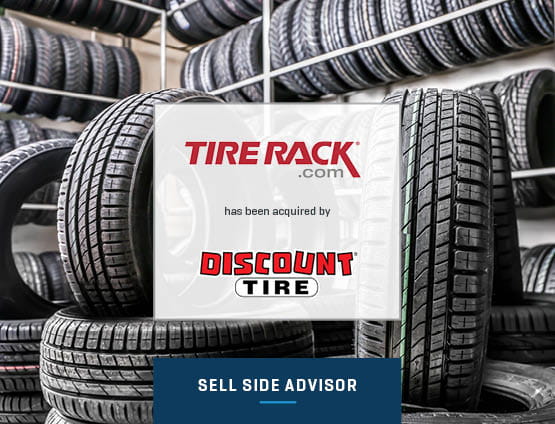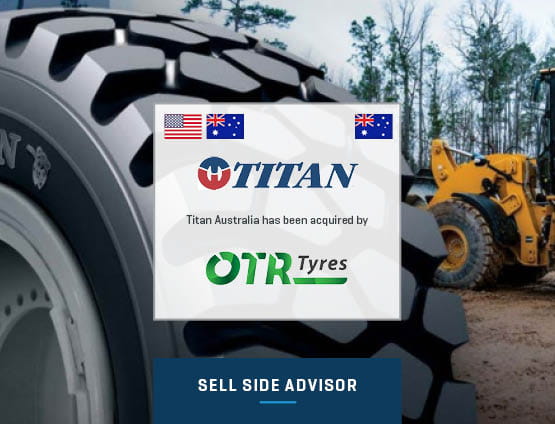Inflationary Pressures and Consumer Trends Are Affecting M&A
Inflationary Pressures and Consumer Trends Are Affecting M&A
A look at how inflationary pressures and consumer trends are impacting M&A in the tire industry.
Article originally featured in Tire Review Magazine’s “State of the Industry” issue.
In the past year, tire industry M&A experienced a number of obstacles, with headwinds emanating from an increasingly challenging economic environment and a worsening global geopolitical climate. Many of these dynamics will continue into 2024, a year in which we expect that investors will adopt a heightened sense of urgency to invest sidelined funds in the high-quality assets the industry has to offer in competition with strategic acquirers, who will continue to pursue a strategy consisting of growth via M&A.
Broad Market Headwinds
Rapidly Rising Interest Rates: Investors have had to navigate the impact of rapidly rising interest rates for just the second time in two decades. In 2023, the 10-year note briefly touched a 5% yield, leading to higher general borrowing costs and, in some cases, cashflow challenges given significantly higher interest payments for levered companies.
While credit remains available, these elevated interest rates have had significant implications on valuations and post-leverage cashflows, requiring firms to adapt their financial strategies and capital structures.
Geopolitical Uncertainty: Significant geopolitical turmoil occurred in 2023, with the continuation of the Russia-Ukraine conflict, conflict in the Middle East with potentially massive ramifications, and tensions around China and Taiwan as well as other hot spots (such as Sahel Africa). These could negatively affect global tire building capacity.
Global leaders have failed to dampen conflict points and only seem to have succeeded in escalation. The Russia-Ukraine conflict continues to impact energy, global trade, commodities, and currencies amid geopolitical fractures and changing affiliations. Similarly, the broader Middle East is a powder keg that appears to have the potential to escalate beyond the control of any one party involved. The growing conflict in the Middle East is also bound to impact energy prices, which will have a downward impact on miles driven and ultimately tire demand. This will also eventually impact raw material prices.
The talk of de-dollarization, coupled with now extensive sanctions and trade diversions, has also added complexity to international trade, impacting the tire industry’s global supply chain and pricing dynamics. This includes increased emphasis of central bank digital currencies and Bitcoin/cryptocurrency as potential options.
Pre-Election Uncertainty: Political uncertainties, especially in the lead-up to the 2024 U.S. presidential election, have the potential to disrupt domestic economic stability. Uncertainties revolve around former President Trump’s trials as well as President Biden’s age and rumors that he may not be the Democratic nominee. More turbulence is expected in 2024 as the election nears, prompting wary investors and sellers to carefully assess optimal transactions.
Inflation and Consumer Impact: Inflationary pressures have hit consumers hard, affecting their cost of living and increasing debt servicing. While consumers remain gainfully employed, these economic challenges are worth watching. But decreased real wages are prompting consumers to postpone tire purchases when possible.
Additionally, continued price increases by tier one and two manufacturers have shifted volume materially to tier three and four product. Distributors and retailers serving this market are performing well, especially those who control their own brands. These companies continue to attract investor attention.
Retail/Wholesale Recap
There has been a recent influx of new private equity (PE) entrants into the retail sector, exemplified by players like Sterling Group – with their formation of Premier Tire & Service, Garnett Station, and Bestige. These newcomers indicate a growing interest in the industry, adding to the competitive landscape.
Notably, five of the leading retailers in this space — Mavis, Les Schwab, Sun Auto, Big Brand Tire, and Greatwater 360 — are all backed by private equity firms, collectively representing a substantial presence with over 3,000 points of sale.
The retail market remains active in terms of M&A activity. However, there are concerns about a potential plateau in “miles driven” which may impact tire replacement demand and in turn deal flow.
The industry is already witnessing an accumulation of capital on the sidelines with a keen interest to invest, leading to growing impatience among limited partners (LPs) that are urging their business development and investment teams to deploy these funds in suitable opportunities.
While retail consolidation persists, there appears to be a parallel emphasis on integrating acquired businesses and achieving sequential expansion in same-store sales, which can be driven by preventive maintenance and service, especially in harsher climates.
Notable Transactions
In a sizable transaction, Mavis acquired TBC’s Retail network, which significantly enhances their Eastern U.S. presence, albeit with ongoing integration as a focal point. Discount Tire acquired Dunn Tire, marking a substantial move into the New York and Northeast markets, with Dunn representing a notable shift toward service.
In contrast, the wholesale segment has experienced few sizable transactions since the USAF/MFI deal in early 2022. Of notable exception has been Kingswood Capital Management’s acquisition of Turbo Wholesale Tire and its subsequent acquisition of Tire Wholesalers Inc.
Commercial Recap
The demand for specialty tires remains robust, while truck tire demand faces challenges due to excess inventories and lower replacement demand. Many dealers have grappled with excess stock and declining prices, but in the prior year, stocking dealers held leverage through product availability, leading to market share gains for leading players, even though some concessions were made in 2023 regarding pricing.
Larger legacy players challenged by generational continuity are exploring ways to embark on a path to seek liquidity and external investment to diversify family assets and plan for potential transition and future industry evolutions. We expect to see creative transactions in the coming years, while large commercial players continue to make opportunistic and growth acquisitions of their smaller counterparts.
Manufacturers have largely divested themselves from company-owned commercial networks (with the notable exception of Goodyear), although these manufacturers aim to maintain a level of control over their relationships with major commercial tire partners, especially concerning retreading and national account services. Therefore, we expect manufacturer/dealer dynamics in the years ahead to evolve toward a new paradigm.
Additionally, Southeast Asian (primarily Chinese) tire makers have shown considerable interest in potential plant building in North America, principally in Mexico.
Notable Transactions
Notable transactions include BP’s $1.3 billion acquisition of TravelCenters of America aimed at complementing their existing convenience and mobility business, expanding their offerings to include EV charging, biofuels, RNG, truck maintenance and repair, and full-service options.
McCarthy Tire’s acquisitions of Roli Retreads and Dice’s Tire enable McCarthy to establish a presence in Long Island, with retread facilities catering to the high-demand market, while Dice’s Tire’s Bandag plant brings McCarthy’s total to 14 plants, enhancing coverage in Pennsylvania.
Pomps’ acquisition of Royal Tire strengthens their service culture and expands their presence with 17 locations and three retread facilities in Minnesota and North Dakota markets.
STM’s acquisition of Friend Tire Co., previously owned by Yokohama, includes nine additional distribution centers spanning from Mountain States to New Mexico, Texas, and the South, with STM continuing to sell the Yokohama brand.
Other notable acquisitions include Service Tire’s acquisition of Giant Tire Service and Sumerel Tire’s acquisition of Flynn’s commercial business.
2024 Expectations
- Market: Headwinds and geopolitical turbulence will continue to impact the broader economic and M&A environment.
- Industry: Given the non-discretionary and resilient nature of the tire industry, capital will continue to be attracted across the breadth of the transaction size spectrum.
- Segments:
- Retail: Consolidation to continue and be driven by both investors and strategic acquirers, with the pool of available, market-leading independent dealers being reduced further and creating scarcity.
- Wholesale: Legacy wholesale platforms are likely to remain on the sidelines as it pertains to large M&A, while midsized companies with institutional backing will be on the hunt for M&A opportunities. There remains a prospect of large institutional investors making investments in or acquiring existing large wholesalers.
- Commercial: Expect leading commercial dealers to continue to acquire smaller operations, as well as the ownership exploring liquidity options, potentially in the realm of minority sales, dividend recaps, and/or ESOPs. Ultimately, institutional capital entering the commercial segment will be a highly positive element.
- Dealers with ambitions to sell or achieve partial liquidity who are waiting for a more favorable economic climate or better performance results should discuss this approach with their advisors. Many of the initiatives that cautious dealers are postponing for the future are currently being supported by investors, who are valuing these opportunities highly in transactions.




